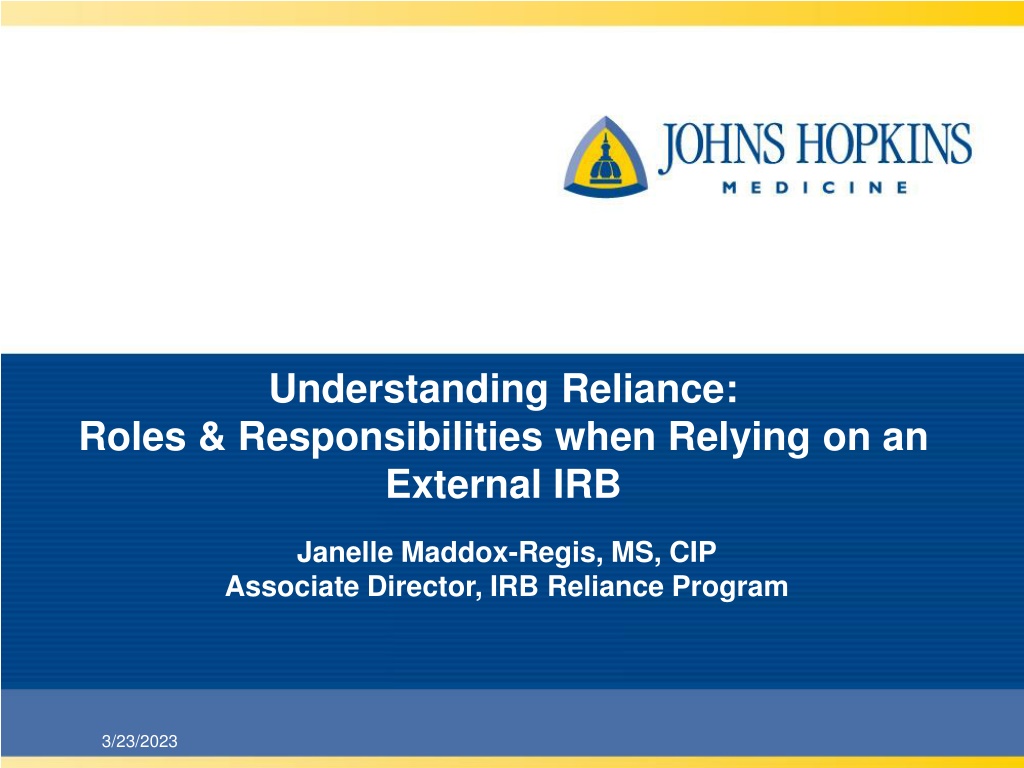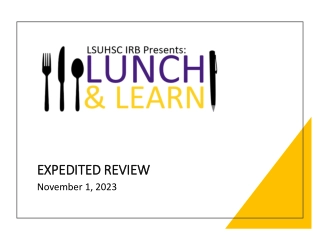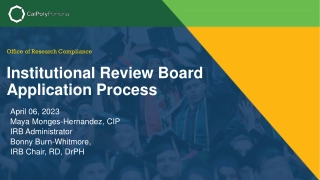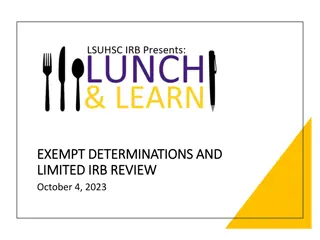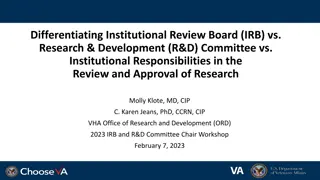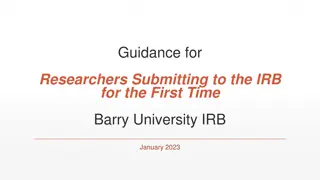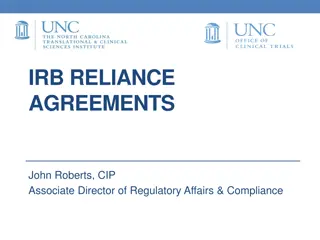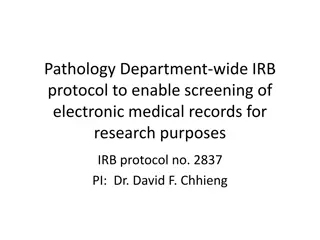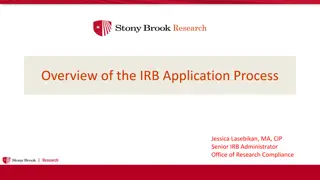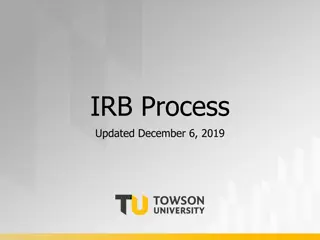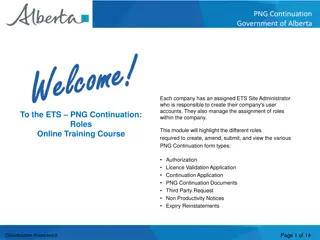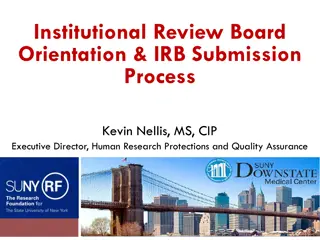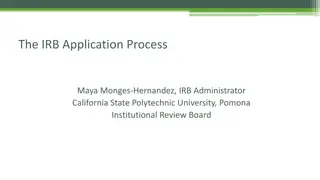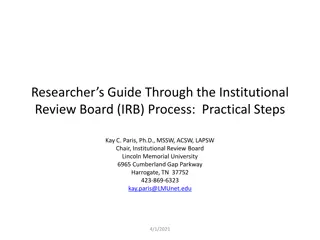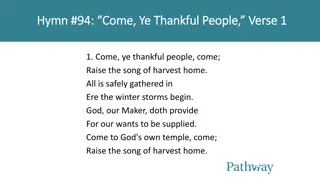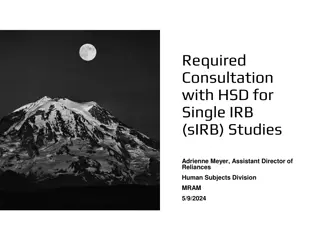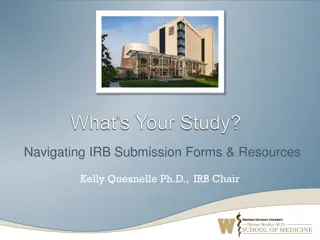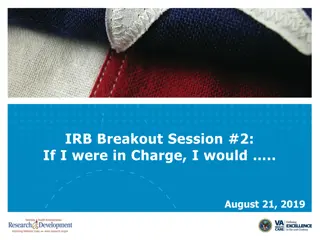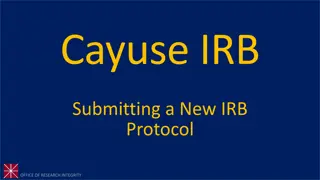Understanding IRB Reliance: Roles and Responsibilities
This content delves into the roles and responsibilities involved when relying on an external IRB, covering regulatory requirements, the reliance request process, why local context review is essential, and more. It discusses NIH policies, the use of a single IRB for multi-site research, exceptions to the policy, and additional regulatory requirements for sIRB review. National initiatives supporting single IRB review are also highlighted.
Download Presentation

Please find below an Image/Link to download the presentation.
The content on the website is provided AS IS for your information and personal use only. It may not be sold, licensed, or shared on other websites without obtaining consent from the author. Download presentation by click this link. If you encounter any issues during the download, it is possible that the publisher has removed the file from their server.
E N D
Presentation Transcript
Understanding Reliance: Roles & Responsibilities when Relying on an External IRB Janelle Maddox-Regis, MS, CIP Associate Director, IRB Reliance Program 3/23/2023
Overview Regulatory Requirements for sIRB Review NIH Policy Final Rule The Reliance Request Process Relying on External IRBs Why local context review is needed and what it entails How are External IRB applications processed? Ongoing Local Context Review PI Responsibilities Document Understanding what to report to the JHM IRB when Relying Training and Compliance Requirements 3/23/2023
NIH policy Office of Science Policy Use of a single IRB for multi-site research Exceptions: - Does not apply to Exempt research - International sites [Policy applies to Domestic Sites only] - Does not apply to studies conducted under career development, research training or fellowship awards - Exceptions to this policy will be made where sIRB review would be prohibited by a federal, tribal, or state law, regulation, or policy. - Requests for exceptions that are not based on a legal, regulatory, or policy requirement may be considered by NIH Compelling justification required June 21, 2016: New policy requires single IRB (sIRB) review for multi-site NIH-funded research Effective Date: January 25, 2018 What types of studies does this policy apply to? NIH-funded multi-site studies that involve non-exempt research Multi-site Studies: The same protocol is being conducted at more than one site and the study is being funded wholly or in part by NIH New applications or competitive renewals submitted on or after the effective date https://grants.nih.gov/grants/guide/notice-files/NOT-OD-16- 094.html sIRB is the selected IRB of record that conducts the ethical review for participating sites of the multi-site study. 3/23/2023
Additional Regulatory Requirements for sIRB Review Final rule: Published January 19, 2017 Effective Date: July 19, 2018 [For select provisions only] General Effective/Compliance date: January 21, 2019 Common Rule extends Single IRB review requirement to all cooperative research [Research involving one or more institutions] Required implementation date for this provision: January 20, 2020 Under the 21st Century Cures Act the FDA is required to harmonize its applicable regulations for human subjects protections to align with Common Rule changes to the extent possible by December 2019. [May include requirements for sIRB review]. 3/23/2023
NATIONAL INITIATIVES TO SUPPORT SINGLE IRB REVIEW 3/23/2023
What is a Reliance Agreement? A Reliance Agreement is a formal, written document that provides a mechanism for an institution engaged in research to delegate institutional review board (IRB) review to an independent IRB or an IRB of another institution. Institutions that are engaged in human subjects research, where one institution will rely on the other institution s IRB, must agree to the terms of the Reliance Agreement before research can begin. 3/23/2023
SMART IRB Reliance Agreement In anticipation of the release of the NIH policy, the National Center for Advancing Translational Sciences [NCATS] funded a multi-institutional collaborative initiative to develop a national IRB reliance agreement [SMART IRB] As of September 2016, this agreement is now available: https://smartirb.org/ FWA-holding Institutions sign on to use the agreement through a joinder process. Once you are a signatory to SMART, you may use SMART as your reliance agreement for any specific study that also involves institutions that are SMART signatories Key Facts: Eliminates the need for study- specific reliance agreement negotiations Institutions may have addendums to cover items not specified in the agreement such as indemnification [JHM IRB does require an indemnification addendum] Institutions must have an FWA [FederalWide Assurance] to sign on SMART IRB logo 1000+ signatories 64 CTSA Hubs 3/23/2023
Trial Innovation Network Initiative launched by the National Center for Advancing Translational Science (NCATS) to leverage the resources of the CTSAs and help accelerate clinical trials Three Trial Innovation Centers [TICs] each with their own central IRB [CIRB]: University of Utah Duke University/Vanderbilt University Johns Hopkins University School of Medicine/Tufts University Recruitment Innovation Center [RIC]: Vanderbilt University Trial Assignment through the Network CIRB Development Development of SOPs Develop systems to support the activities of the CIRB Develop plans to monitor the IRB approval process and develop metrics to evaluate CIRB success Work with other TICs to develop innovative strategies for operationalizing CIRB review. Activity of the TIC CIRBs is supported by a platform hosted by Vanderbilt 3/23/2023
STEP 1: REQUESTING RELIANCE ON AN EXTERNAL IRB 3/23/2023
Reliance Request Process Mandatory Use of Online Reliance Request Tool: Investigators may not indicate in a grant application that a JHU is willing to rely on an external IRB without first securing a letter of support from the appropriate IRB office. Online Reliance Request Tool enables easy communication with the JHM IRB at the time of grant proposal Required letter of support Question added to electronic grant submission systems to require upload of a letter of support to verify the organization agreed to rely on an external IRB Creates an electronic hard stop to ensure the organization agreed to rely on an external IRB This decision must be made at the institutional rather than the investigator letter https://www.hopkinsmedicine.org/institutional_review_board/ab out/agreements/reliance_agreement.html 3/23/2023
Step 1: The Reliance Request Process Submit a request through the Reliance Request Survey Information collected in the survey will be evaluated by JHM s sIRB team. Additional questions may be asked to obtain more information about JH s role in the research project. JHM IRB will agree to rely [when appropriate] and execute any needed reliance agreements/cede letters. When possible, JHM IRB will use SMART IRB as the basis for all reliance agreements. 3/23/2023
Reliance Request Process: Planning Stage & Ready For IRB Submission Once we have approved a reliance request, the investigator will be provided with the following: Planning Stage Letter of Support [confirming that JHM agrees to rely on the External IRB] to be included in the grant submission Cede to External IRB via letter or alternative platform [e.g., SMART IRB Online Reliance System]- If necessary at this time point Ready for IRB Submission Confirm reliance agreement is in place Cede to External IRB via letter or alternative platform [e.g., SMART IRB Online Reliance System] 3/23/2023
Key factors Considered when Processing Requests to Rely on an External IRB Is the IRB of Record willing to utilize the SMART IRB agreement as the basis for reliance? Reviewing and executing study-specific agreements is time-consuming and burdensome Requires review by JHU legal Is the IRB of Record reputable? AAHRPP-accredited Experienced with type of review that will be performed Valid reason for the selection of the IRB of Record [e.g. it is the home IRB of the Overall PI for a multi-site study] There is no list of approved external IRBs; all requests to rely are reviewed and cede determinations are made based on the above criteria and other study-specific factors. 3/23/2023
Key factors Considered when Processing Requests to Rely on an External IRB Is reliance required? If not required it may NOT be faster and reliance may not be recommended Only required for federally-funded studies and for certain funding opportunities Not required for most of the following: Industry/commercially-funded studies QI/NHSR activities these determinations need to be made at the local IRB level Are there any unique factors that would suggest local IRB review will be intensive [and thus reliance may not be appropriate]? E.g. unique state law issues, local review requirements 3/23/2023
STEP 2: LOCAL CONTEXT REVIEW BY JHM IRB 3/23/2023
Single IRB Review Single Institutional Review Responsibilities given to an sIRB IRBReview Grants and Contracts Each Participating Site s Institution retains responsibility for ancillary and institutional reviews and verifications. Review of investigator training and expertise Institutional Resources Review Ancillary Reviews (Safety, Scientific, COI) Monitoring compliance with local, state laws; HIPAA 3/23/2023
What is a Relying Organizations Responsibility? Each Relying Institution will Communicate to the Reviewing IRB the requirements of any applicable state or local laws, regulations, institutional policies, standards, or other local factors, including local ancillary reviews, relevant to the Research ( Local Considerations ) that would affect the conduct or approval of the Research at the Relying Institution. Such communication may be made through the Reviewing IRB s designee, as determined by the Participating Institutions in connection with the specific Research. [SMART IRB Agreement]. 3/23/2023
What types of things do relying sites remain responsible for? Education/Training/Qualifications. Ensuring that its Research Personnel have adequate education, training, and qualifications to perform the research and safeguard the rights and welfare of participants. This includes ensuring personnel are credentialed to perform the research procedures. Compliance: Ensuring research personnel comply with determinations of the reviewing IRB and all applicable laws/institutional requirements. Institutional Reviews: Ensuring all applicable institutional reviews required for the research to be conducted at that site are performed [e.g. radiation safety review, COI review, etc.] Perform local context review: Communicate to the reviewing IRB the requirements of any local laws, ancillary reviews, etc. and provide any required site-specific information for the consent form, where applicable. 3/23/2023
Step 2: Local Context Review If JHM IRB agrees to rely, the JHM investigator will receive an email at the time of approval of the reliance request, a cede letter to share with the External IRB [if applicable], and a summary of next steps, including instructions on how to complete an External IRB application. Resources are available on the IRB website to assist with your submission. https://www.hopkinsmedicine.org/institutional_review_board/for ms/ 3/23/2023
Step 2: Local Context Review: 1 - General Information Select Yes to Question 8 to indicate that an external IRB will act as the IRB of record for this study Select or provide the name of the External IRB [the name of the IRB must match the name provided in the approved reliance request]. Select Yes to Question 9 and select Multi-site study 3/23/2023
Step 2: Local Context Review: 2 - Study Team Compliance Training Any PI named on an external IRB application is required to complete an online training course: Understanding Reliance: Roles and Responsibilities when Relying on an External IRB. The training will review the initial steps to request reliance on an external IRB, outline how to submit an external IRB application to the JHM IRB and review the roles and responsibilities of local site PIs and study teams when relying on an external IRB. In Section 2, Question 2, upload a copy of the completion certificate. 3/23/2023
Step 2: Local Context Review: 6 - Protocol Information Do Not build a new eForm A or Investigator-initiated protocol. Upload a copy the multi-site protocol approved by the External IRB. 3/23/2023
Step 2: Local Context Review: 10 - Study Location Do Not add the external IRB as a study location under Other Non-Hopkins Sites . If there are Hopkins-affiliated sites, please add them in their appropriate sub-section. 3/23/2023
Step 2: Local Context Review: 13 - Recruitment Information Select Yes to Question 5 if the External IRB has provided any broad-use recruitment materials, or if you intend to use Hopkins- specific recruitment materials. Do Not upload a HIPAA Form 4 [Waiver of Privacy Authorization] if Hopkins is not the Privacy Board. When using the SMART IRB agreement, typically the External IRB is serving as the Privacy Board. Please refer to the terms of the Reliance Agreement. 3/23/2023
Step 2: Local Context Review: 15 - Written Consent **For studies that will be enrolling at a JHM site via a process that includes consent** The External IRB may either (a) build the site-specific consent based on information JH supplies or (b) request that relying site build its own site-specific consent. It is important to confirm with the external IRB which process they follow before beginning your external IRB application. If the External IRB will build the site-specific consent for the Hopkins site: Upload a copy of the approved master template consent. JHM IRB will point out the JHM required consent form language specific to this study and include it in the letter documenting the JHM IRB s local context review outcome. If the External IRB has requested that relying sites build their own site-specific consent: Upload a copy of the approved master template consent. Upload a tailored version of the site-specific consent for use at JH that includes JHM-required consent language found in the following guidance: JHM Consent Language 3/23/2023
Step 2: Local Context Review: 20 - Supplemental Study Documents In Supplemental Study Documents , Question 2, upload the following A document summarizing JH s scope of work Any documentation provided by the External IRB that the JHM IRB is required to complete as part of its local review [often referred to as local context forms ] A signed copy of the Statement of PI Responsibilities when Relying on an External IRB form. PI s of external IRB studies but sign the form once and upload in subsequent submissions. The document outlines JHM s responsibility for ensuring all local ancillary reviews required to conduct the research at this site are completed and for ensuring that any local requirements are communicated to the IRB of Record. 3/23/2023
Step 2: Local Context Review: 38 - Approval Documents In Question 1, upload a copy of the External IRB s initial approval letter for the study. In Question 3, if provided, upload a copy of the External IRB's approved IRB application. 3/23/2023
Step 2: Local Context Review Review Process & Workflow (6) Application Acknowledged; JH is activated as a participating site. (1) JHM PI submits External IRB application (2) SIRB Review Pre (3) Compliance Review (4) SIRB Review Post (5) Outcomes & Letters (1) Pre-requisite: Reliance Request Survey has been completed; JHM has agreed to cede to the External IRB. PI submits external IRB application in eIRB Normal pre-reviews required by the institution still occur per normal procedure [e.g. ED review, etc.] (2) sIRB Pre-Review verifies compliance training is complete; confirms that JHM has agreed to rely; confirms application includes requested documentation [e.g., multi-site protocol; template consent and/or a tailored version of the JHM consent]. 3/23/2023
Step 2: Local Context Review Review Process & Workflow (6) Application Acknowledged; JH is activated as a participating site. (1) JHM PI submits External IRB application (2) SIRB Review Pre (3) Compliance Review (4) SIRB Review Post (5) Outcomes & Letters (3) If the study is returned, upon re-submission, the response is reviewed by the sIRB team and if adequate, referred to the sIRB Post- Reviewer for finalization. The sIRB post-reviewer completes any local context forms required by the External IRB and confirms that any pending ancillary reviews have been completed. (3a) If Hopkins will consent participants, the Consent Form Specialist (CFS) reviews the consent and confirm that JH-required language is present (if a tailored consent has been supplied) or point out the JHM language needed (if the external IRB will build the consent) at this stage. 3/23/2023
Step 2: Local Context Review Review Process & Workflow (6) Application Acknowledged; JH is activated as a participating site. (1) JHM PI submits External IRB application (2) SIRB Review Pre (3) Compliance Review (4) SIRB Review Post (5) Outcomes & Letters (4) Primary/Regulatory Reviewer performs regulatory and local/institutional policy checks; confirms required ancillary reviews are complete/in-process; confirms applicable regulatory determinations [e.g., pediatric risk, IND/IDE exemptions] were made by the External IRB and are documented in the application. The primary reviewer can finalize their review OR refers to Convened meeting, as necessary. 3/23/2023
Step 2: Local Context Review Review Process & Workflow (6) Application Acknowledged; JH is activated as a participating site. (1) JHM PI submits External IRB application (2) SIRB Review Pre (3) Compliance Review (4) SIRB Review Post (5) Outcomes & Letters (5) Reliance Analyst records the local context review outcome or Tabled , Acknowledged or Acknowledged with Administrative Changes [ACKWAC]. If Tabled or ACKWAC d, a letter will be drafted detailing additional requirements to activate JH as a participating site. The following must be submitted to the JHM IRB before the JH site can be acknowledged/activated: Final approval letter from External IRB indicating JH is an approved site; Stamped version of JH consent from the External IRB (6) If previously Tabled or ACKWAC d, JHM PI submits a response with required information; Reliance Analyst records the local context review outcome, Acknowledged , activating JH as a participating site. At this stage the expiration date is set in eIRB to match the expiration date of the external IRB for approval of the study. Acknowledged means the study is approved to be conducted at the indicated Hopkins sites. An Approval letter is not generated as Hopkins is NOT the IRB of Record. 3/23/2023
ONGOING LOCAL CONTEXT REVIEW 3/23/2023
Ongoing Local Context Review Organizations remain responsible for their institutional responsibilities throughout the life of the study. In order to fulfill these responsibilities organizations must be kept up-to-date of changes that impact their local responsibilities/local context review. A signed copy of the Statement of PI Responsibilities when Relying on an External IRB must be uploaded with each external IRB application. This document is meant to inform the PI what must be submitted to the JHM IRB during the life of the study. 3/23/2023
Ongoing Local Context IRB: Submission Requirements Study Team Changes Changes to study team members Changes in PI Newly identified conflicts of interest/changes in existing conflicts of interest [additional reporting to the sIRB may also be required] 3/23/2023
Ongoing Local Context IRB: Submission Requirements Changes that impact local/ancillary review Examples: Changes for which there is a specific institutional policy/state law requirement Changes that impact procedures that have a billable code in EPIC (for which a change in the PRA would be required) Changes to drug dispensation, dosing or the targeted population [e.g. changes to the inclusion/exclusion criteria for studies involving an investigational or approved drug used for research purposes] Changes to plans for research radiation exposure [including a change to the number of subjects exposed or the inclusion of a new population, e.g. minors] Changes that trigger additional JHM data access/storage review 3/23/2023
Ongoing Local Context IRB: Submission Requirements Annual Approval Letter from sIRB JHM IRB WILL set an expiration date in eIRB that WILL impact the study team s ability to enroll subjects in CRMS. The annual re-approval letter must be supplied to the JHM IRB (prior to expiration of the protocol in the JHM IRB database) in order to maintain an active record (this record will align with the current approval as assigned by the IRB of record). Any delay in submitting the annual approval letter from the external IRB may delay the study team s ability to continue enrollment locally. The letter is submitted via an activity called Upload External IRB Approval rather than via continuing review. No continuing review submission is required for external IRB applications. 3/23/2023
Ongoing Local Context IRB: Submission Requirements Reportable Events: Study teams must submit any protocol event reports that meet JHU s reporting criteria in accordance with JHU s local reporting requirements This is a parallel report to the report to the external IRB Study teams must consult JHM IRB if they are uncertain whether an event requires dual reporting to the external IRB and JHM IRB. JHM reporting timelines should be followed locally for these event reports; Study teams must promptly report to the JHM IRB any notifications of suspension or termination that they receive for the applicable study from the external IRB; JHM IRB needs to be involved in the review and follow- up of these events 3/23/2023
Training Requirements This training is required the first time a PI is listed on an external IRB application. Required for all new external IRB applications submitted 1/1/2019 or later For PIs on existing external IRB applications the training will be required at the time of annual renewal of your external IRB application Training must only be completed once A copy of the training certificate must be uploaded in the application. Training can be satisfied in-person or online All study team members are strongly encouraged to complete the training 3/23/2023
Compliance Considerations: Monitoring Studies where JH relies on an external IRB have been added to the priority list of studies for internal monitoring [unless otherwise subject to monitoring by the SKCCC CRO] Priority monitoring visit will occur within 1 year of study initiation Adherence with local review requirements will be evaluated through monitoring efforts 3/23/2023
Questions/Discussion Contact Information: Megan Kasimatis Singleton, JD, MBE, CIP Associate Dean for Human Research Protection and Director of the Human Research Protection Program MSingl16@jhmi.edu Janelle Maddox-Regis, MS, CIP Associate Director, IRB Reliance Program jmaddox3@jhmi.edu Scott Hines, MLA IRB Reliance Analyst shines4@jhmi.edu Jennifer Pugh, MPH, CPH IRB Reliance Coordinator jpugh17@jhmi.edu Mathilda Barnes, MA, CCRP IRB Reliance Analyst mbarnes2@jhmi.edu 3/23/2023
